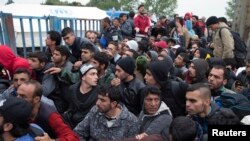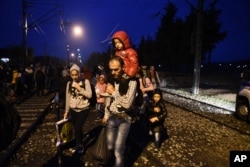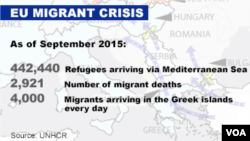Europe must urgently produce a coordinated response to the mass exodus of refugees from Syria and Iraq, and whatever measures are agreed will need to be extended and beefed up as part of a wider adjustment in long-term migration policy, the OECD said.
In an appeal made as EU countries try again to bridge deep differences on the matter at emergency talks in Brussels, the Organization for Economic Cooperation and Development said 1 million people could request asylum in Europe this year, more than at any time since World War II.
"Europe has both the obligation and the capacity to deal with this unprecedented and tragic crisis," said the Paris-based organization which offers policy advice to industrialized countries.
Failure to agree a joint emergency plan and couple it with a modernized long-term policy on integration of migrants could fuel the fear of foreigners that partly explains government inaction to date, the OECD said in an annual report.
Coordinated response
While Europe had better legal and institutional structures to deal with the influx than during the previous large wave of war refugees fleeing the former Yugoslavia in the early 1990s, countries like Poland, Hungary and Bulgaria need financial aid from other EU partners to cope, it said.
"This is clearly an emergency situation that requires a coordinated response at both European and global level," it added.
"The anxiety regarding migration issues has reached new highs and anti-immigrant sentiment is spreading," it said, adding; "The failure to anticipate current trends may actually have a very detrimental effect on trust and ultimately the capacity to adapt further emergency policy responses, but also, more generally, to adapt migration management systems as required."
Crucial right now was rapid processing of asylum requests as well as an agreed shareout of refugees across EU countries, the OECD said, adding that in the region of 350,000 to 450,000 of the 1 million arrivals this year would likely be granted asylum.
That is vastly more than the 120,000 intake that the European Commission is trying to get EU governments to cater for over the next two years.
Record inflow
The OECD said that inflows of migrants in the broadest sense - including economic migrants, au pairs and seasonal workers, for example - was also likely to hit a record in 2015 across the 34 industrialized countries of the OECD's membership.
On the humanitarian side, some 800,000 asylum applications were registered across OECD countries in 2014, among them 130,000 from Syrians and 65,000 from Iraqis, the report said.
Applications from Serbia/Kosovo, Afghanistan and Eritrea totaled 40,000 apiece while 15,000 Ukrainians sought asylum, a tenfold rise from 2013, says the OECD, largely using U.N., EU and national statistics.
Of the expected 1 million asylum seekers this year, latest data showed more than 330,000 migrants arrived by sea in Europe in the first eight months, including 210,000 in Greece and 120,000 in Italy. Half a million illegal border crossings have been detected in the same period, almost double the level over the whole of 2014.
The OECD said immigration policy in general had become more restrictive in industrialized countries in recent years, with many countries setting quotas, imposing tougher conditions for family groups and focusing on more qualified or skilled workers.
Broader trend
While the immediate priority is handling refugees from war zones, rich countries must adapt migration policy to a broader trend where one in 10 migrants to OECD countries is from China and almost one in 20 from India, the OECD said.
Immigrants used to raise the total population of Europe by just 100,000 a year until the mid-1980s but falling birth rates and rising inflows had raised that to 600,000 a year in the 1990s and more than a million a year now, it said.
The OECD alludes to voter concern about integration and failure by governments to build consensus on an issue which has in recent years played into the hands of anti-immigrant parties like France's National Front.
"Migration has been the biggest engine of demographic growth in the EU as a whole since the mid-1990s," it said. "It is about to become the only one."















